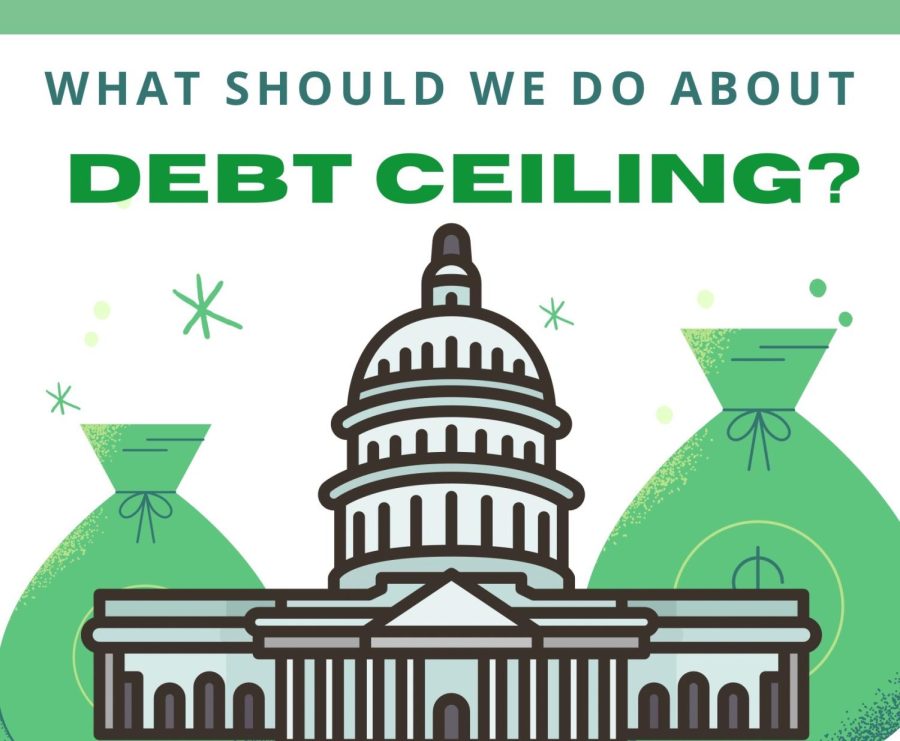What should we do about the debt ceiling?
The US debt has skyrocketed recently.
March 2, 2023
After the United States reached its debt ceiling in January, many citizens raised questions about the next step for America when it comes to raising the ceiling once again.
The debt ceiling is the legal limit on the total amount of federal debt the government can accrue. The government has roughly 24.5 trillion in debt held by the public and around 6.9 trillion in debt from the government owing itself through borrowing from government accounts, like social security and medicare trust funds. The debt rises due to the annual budget deficits.
“The US debt ceiling is the amount to which we are permitted to borrow or owe. Our borrowing requirements are exceeding our current limitations. We need to raise it in order to keep the government running” said Comp Civics teacher Stacey Sklar.
Congress and the president have modified the debt ceiling over 100 times. In the 1980s the debt ceiling increased from less than 1 trillion to around 3 trillion. Then in the 1990s, it doubled to nearly 6 trillion – and in the 2000s it doubled again to over 12 trillion. Lawmakers have suspended the debt limit seven times since February 2013. The debt limit was increased twice in 2021 to its current amount: over 31 trillion.
“They choose to raise it because the government has two choices; they can cut spending through cutting social programs or they can increase spending through either borrowing money, which would be raising the debt ceiling, or by taxing people more. Taxing people more would not help people get reelected and cutting social programs also works against them” said civics teacher Bee Benson.
Since January, controversies between the republican party and the democratic party arose with the debt ceiling over budgets and social securities and on whose terms the debt ceiling will be raised.
“The debate going on right now is whether we continue to borrow and pass trillions of dollars onto future generations or should we start making cuts or adjustments to programs like Medicare, Medicaid, and Social Security,” said Benson. “That’s mandatory spending by law, then there’s what’s known as discretionary spending, where we have whatever’s left over to choose to spend and the majority of that goes to our military. And so it’s deciding, are we going to cut back on any of those programs or not? Some people want to and some don’t.”
President Joe Biden and House Speaker Kevin Mccarthy met to discuss the issue but the results are still ambiguous.
Republican politicians refuse to raise the debt ceiling without concessions from the Democratic party. Biden’s response insisted on a clean debt ceiling raise without the budget cuts republicans are demanding.
“One party wants the opposite of what the other party does. When each party is in power, they’re fine increasing the debt ceiling. And when they’re not in power, they critique the other party for wanting to raise the debt ceiling,” said Benson.
Biden had resisted direct negotiations linked to actual action for raising the debt ceiling, with the potential of it throwing the economy into chaos. McCarthy wanted to start the conversation. The two have agreed to meet again.
“One could say that those opposing raising it are not necessarily doing so genuinely because they don’t wanna increase the national debt but maybe more because there’s gridlock in the house and they wanna forestall the current administration’s ability to move forward,” said Sklar.
The issue of raising the debt ceiling affects the general public as well. Decisions made could lead to both economic chaos and disruptions in many people’s lives.
“There are programs that groups of people rely upon on a regular basis that if the funding isn’t there for it people could find themselves stuck or government workers may find their paychecks foreload. In the past when we’ve had government shutdowns there have been stoppages in the printing of paychecks for government workers and that could be a problem for a lot of families” said Sklar.
Not raising the ceiling in time or making the wrong decisions could send the economy into ruin with unpaid government bills, interest rates, higher taxes, and instability.
“If we don’t raise the debt ceiling, if we default on our debts, it decreases the value of the US dollar. And the US dollar is the international currency that other currencies are based on. So it could have a worldwide economic impact” said Benson.
These impacts also flow down to the general population.
“You could see your taxes go up. It could affect other institutions like lending institutions and that can raise interest rates. And then that means you would have to pay more money on loans that you take, whether it’s a school loan or a home loan,” said Benson. “And any money you spend on interest doesn’t reduce the cost of the thing you’re trying to pay off. You’re basically just throwing money away every time you make an interest payment.”
The issue also extends to students; if the debt ceiling is not raised it could affect student loans and funds.
“If they don’t increase the debt ceiling a lot more government expenditures and students are gonna get a lot less federal aid for the fast funds and things to pay for college,” said comp civics student Adam Frerich (‘23).
The issue of raising the debt ceiling should be treated with an attitude of agency by not just the government but also by the general public.
With everything laid out, how should we solve the issue? Coming to a bipartisan agreement will be difficult and require a lot of give and take from both parties.
“I think compromise is getting increasingly difficult. Our two-party system is increasing polarization. Eventually, there has to be some kind of compromise because nobody really will be able to go without paychecks or programs but it’s gonna require big concessions on the part of the democrats to get the Republican votes. I think we should cut some military spending and cut back on the NSA” said Sklar.
With the history of raising the ceiling, compromise does not seem completely out of the picture, but as the ceiling grows higher and higher, the debate will only continue to become more important.
“If the strength of the issue becomes strong enough that the American populace is actually being negated from it and being declined then I bet that the contingency will voice their opinions even to the republican party and a small but still compromise can happen,” said Frerich.






